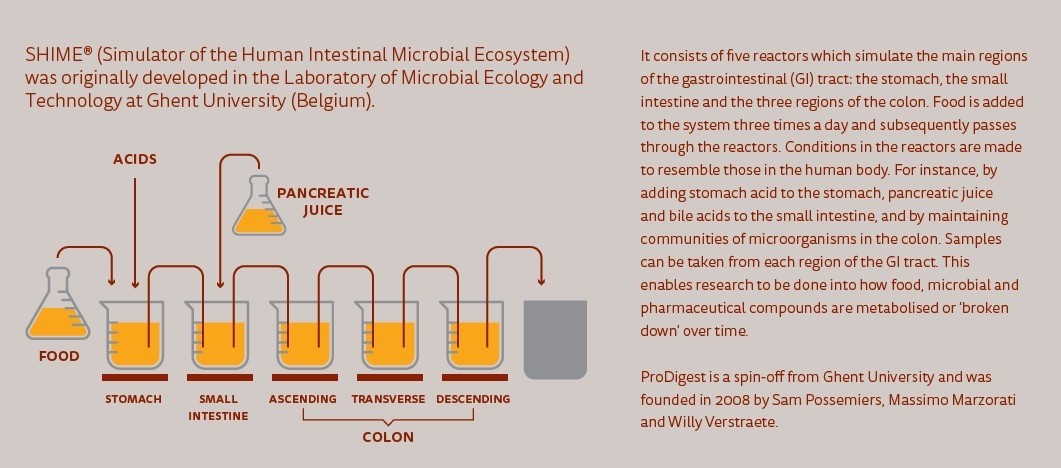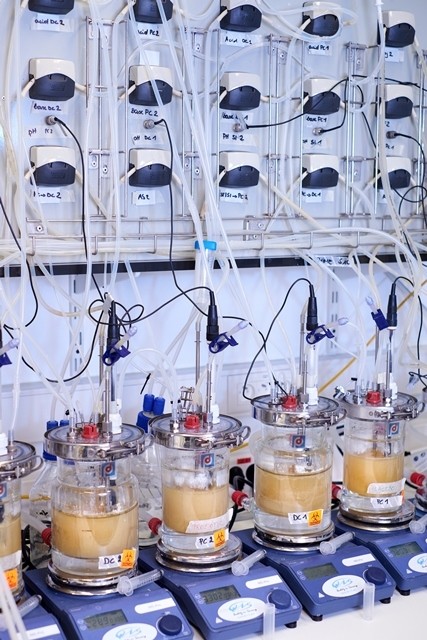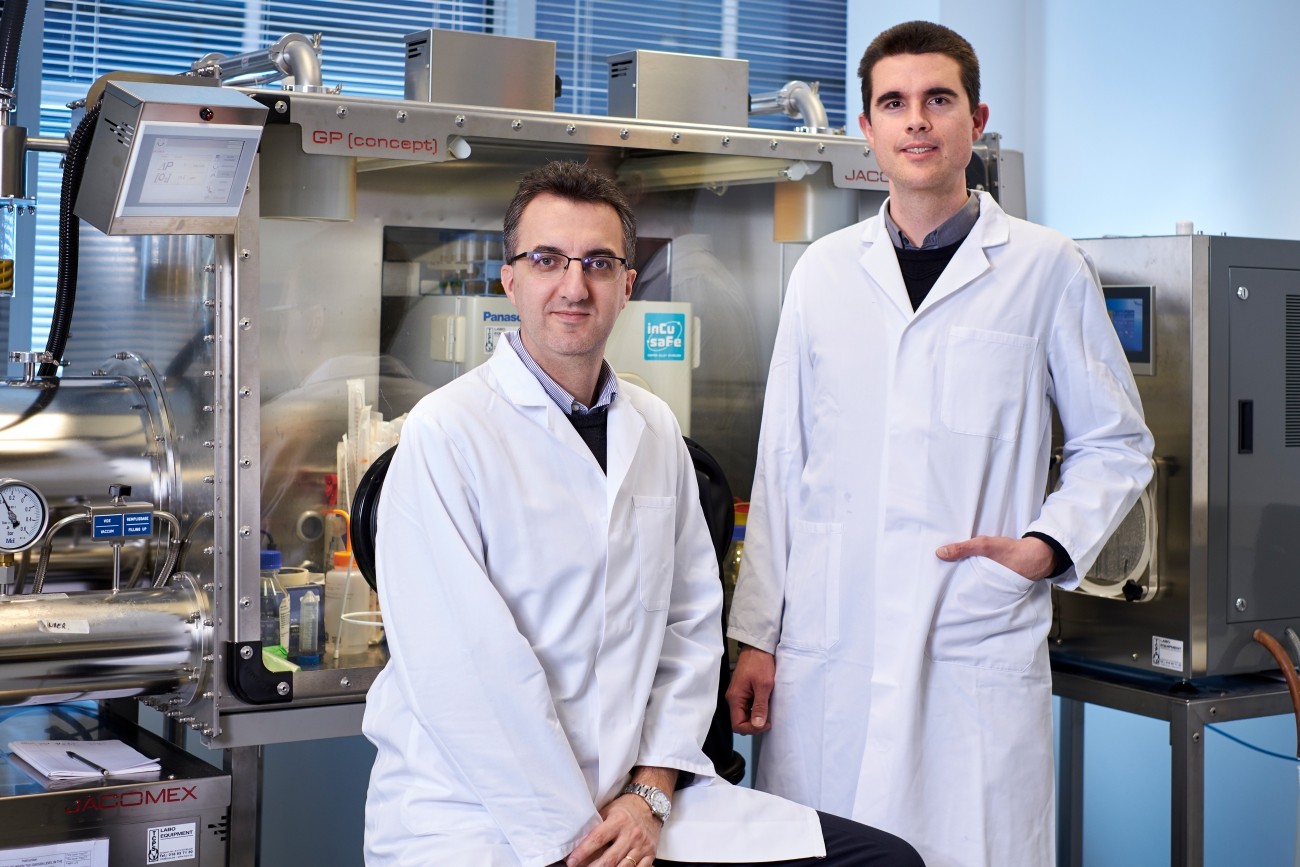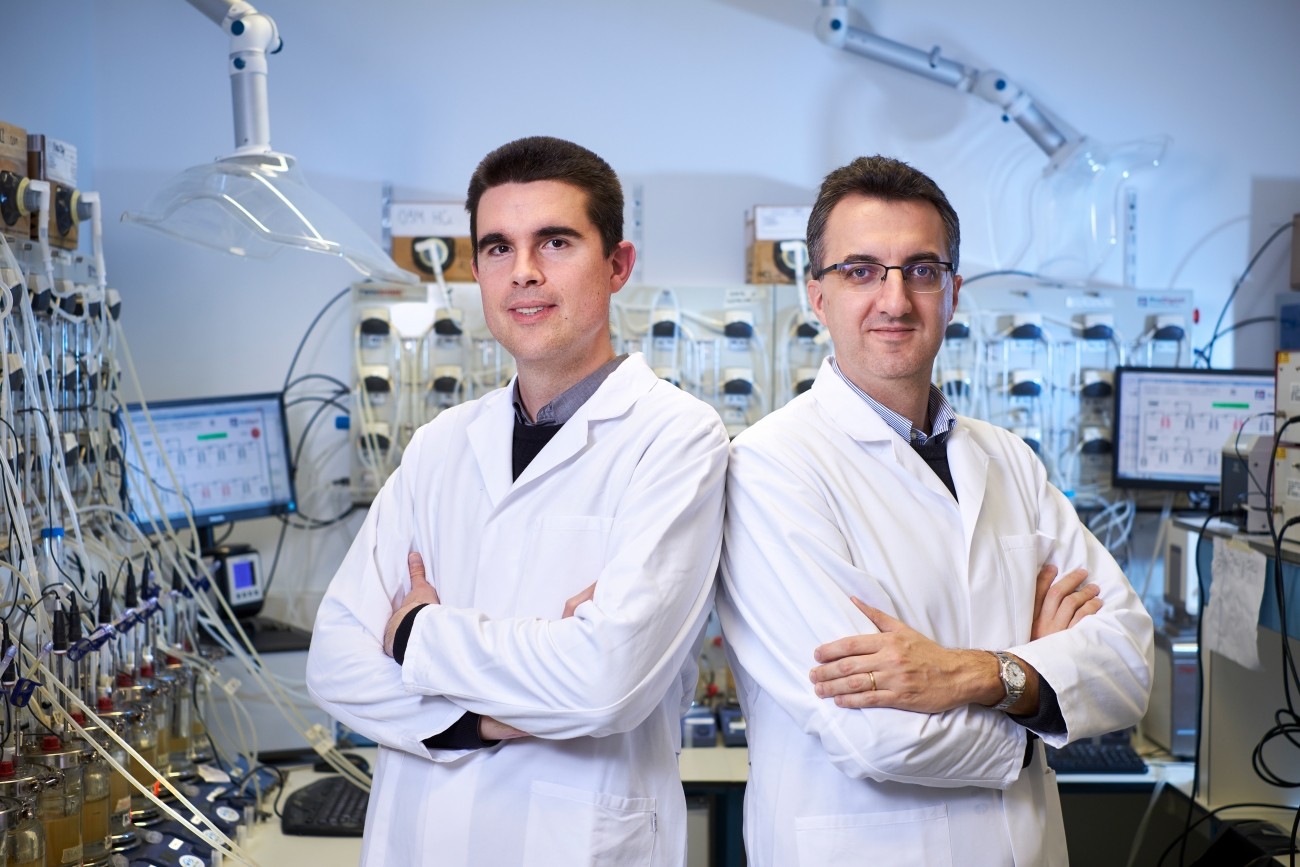

SHIME® digests food and drugs just like humans do
How did ProDigest come about?
Sam Possemiers: "At that time, only a prototype of the gut model existed and it was primarily used for scientific research. However, industry had expressed an interest in using our model to study what happened to food ingredients and pharmaceutical products in the human body. This was an opportunity to provide clients with these types of insights without doing time-consuming and more expensive animal tests or human intervention studies."
Massimo Marzorati: "Equipment that works well for scientific research is however not necessarily suited to commercial applications and the dynamics in a university lab are not designed to accommodate the speed, efficiency and responsiveness that industry requires. This is why we decided to set up a company dedicated to contract research for industry. This involved a lot of operational improvements to the system for improved quality and cost efficiency."
Sam Possemiers: "We still worked for the university during the preparation phase and were fortunate enough to win some initial contract research work from industry. This allowed us to develop ProDigest independently and to really take the time, so that out model could be developed into a fully mature platform and that we could grow in our role as entrepreneurs. We were able to enter with a bang when we were fully ready for it."

How well does the SHIME® system (see box) resemble what goes on inside the human digestive system?
Sam Possemiers: "A good example is the work we did on the metabolism of polyphenols, an active ingredient in many plants that has positive health effects. The activity of these polyphenols differs from one person to the next: some people can break them down, others can't, depending on the microorganisms in their gut. We did a comparison study in which we gave these polyphenols to different people and studied how they digested them. When we used the microorganisms from these people in our model system, the results were identical. If you have that kind of proof, you know that your model can accurately predict what will happen in reality."
Massimo Marzorati: "There are many examples of the various ways in which clients wish to use our model. Sometimes, clients want to see if their active ingredient, a probiotic or a drug, is stable when exposed to conditions in the stomach or small intestine. Other clients are more interested in gut bacteria. A pharmaceutical company may need to know if the intended effect a drug is supposed to have in the colon, actually occurs when it arrives there: will it be stable long enough to have its intended effect, or will the microorganisms degrade it first?"
Sam Possemiers: "Another example is that a big pharma company wanted to use our model to study the stability of their drugs. They first spent a year testing those products with us that they already derived the answers from human studies.Only after we had proved our results were in line with their human studies, were they confident enough to test unknown compounds with us. We have done a lot of these kinds of simulation and validation studies. We have client return rates of 75%, which is another good indicator of the validity and quality of our model."

Who was one of your very first clients and can we find products in a supermarket or a pharmacy today that have gone through your model?
Sam Possemiers: "One of our first clients was Barry Callebaut, the world's largest chocolate manufacturer. They were developing a probiotic chocolate that contained the same healthy bacteria that you find in certain yoghurts and fermented drinks, and wanted to know if you could get the same health benefits from those bacteria by just eating a little chocolate. This turned out to be a very successful study. We discovered the fats in the chocolate form a little protective ball around the bacteria enabling them to be transported to the colon very effectively. Barry Callebaut published extensively about these results and our technology, and served as an ambassador for us. Their probiotic chocolate is still on themarket in some countries. We can't really name other clients or products, but we can say that all major food and many pharma companies are returning clients."
Massimo Marzorati: "Our client portfolio is in line with the market’s evolution. When we talked to pharma companies about gut microorganisms ten years ago, they weren’t really interested. Nowadays, it’s a really hot topic. Our system has proven to be a really good tool for pre-screening molecules in order to get an initial idea of how the drug will impact gut microorganisms and vice versa. It offers an easy and relatively cheap way for pharma companies to direct their R&D investments towards molecules that stand a greater chance of success."
What are your growth expectations for the future?
Sam Possemiers: "Our real growth stage started in 2012 when we moved to our own facilities. Since then, we have achieved double-digit growth each year and expect to do so for the foreseeable future. But whereas contract research has been, and will always be, very important to us, it was never going to be the end of our story. We have always felt that our technology enables us to do much more. So, for the past few years, we have used our knowhow and expertise regarding gut bacteria, to develop novel products based on healthy bacteria. We have set up a separate business unit for this purpose and have given it an incubation period within ProDigest, operating in stealth mode until we are ready to go public."
Have you reached that point yet?
Sam Possemiers: "Yes, we have. We currently have two products that are ready for the consumer market. In fact, we are involved in commercial deals with strategic partners who will bring our products to market in the coming year. We have also built a separate technology platform for our own drug development. ProDigest, headed by Massimo, will continue as a separate entity in our new group structure and will remain focused on contract research. I will head the new entity that will take over the product development activities. We have recently attracted funding from a first investment fund and we are currently running an additional investment round to support our growth ambitions."
Massimo Marzorati: "Yet again, our growth corresponds to developments in the scientific environment and market. Probiotic strains have been used in foods and supplements for years, and now we are witnessing a boom in their pharmaceutical applications. We believe the current gap between food and pharma is gradually decreasing. This creates an opportunity for those companies catering to the entire range of products in which bacteria may offer health benefits, from disease prevention to interception and
treatment. Our experience in working with both of these sectors as well as our scientific background and our leads that fit in either of these categories, means we are ideally positioned to bridge that gap."

You mentioned your field of research is booming. How do you protect your IP and your freedom to operate in such an environment?
Massimo Marzorati: "When ProDigest started, we obtained an exclusive license from Ghent University to exploit the model for industrial applications and to provide services to industry. This requires a great deal of knowledge in many different fields, and a lot of knowhow and 'tips and tricks' that are generally unknown. To this day, our protection is largely contingent on these trade secrets, which make the kind of work we do unique and not easy to reproduce for our competition."
Sam Possemiers: "To protect our IP, it is important that we determine what should be protected by trade secrets, and what should be covered under patent rights. We strive, where possible, to file patents on our gut models as well as on any associated technologies that we develop along the way. The same is true for novel products we develop. Yet, how these products are developed is based on our technology platform and it is these tips and tricks that are a trade secret. With respect to protecting our freedom to operate, we actively monitor what others are doing in our field. If we believe we are being blocked or may become blocked by competing IP, we take the necessary measures to solve that issue."
You have created a remarkable success story as first-time entrepreneurs. What’s your secret?
Sam Possemiers: "Having clear focus and a deliberate, stepbystep company development strategy. Sometimes you have to be flexible in moving the company forward and let it go where it goes, seizing opportunities along the way. But our focus has always been to become a centre of expertise for intestinal and microbiome research. We have tried to diversify within that focus as much as possible. We are currently about to enter our second growth stage, but this is certainly not the final one. We already have ideas about what stages three and four could entail, but it is far too soon to be talking about that. We have enough on our plate right now and will only take further steps when we are ready to do so. "

